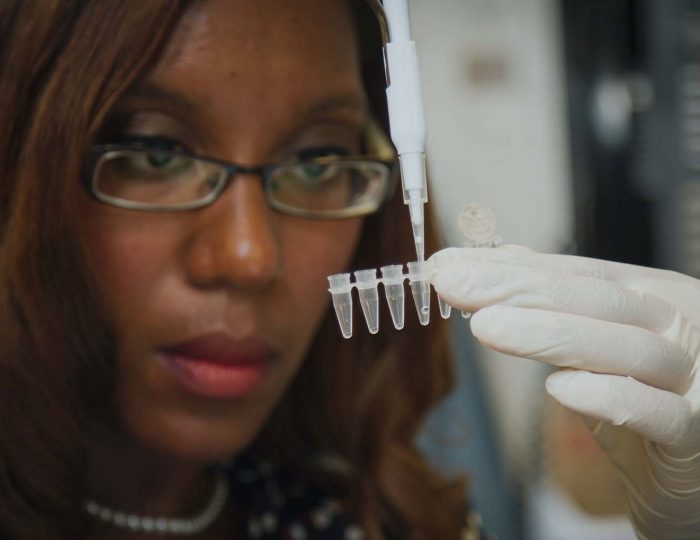Connecting with Culture
It’s been said that culture is ‘what we make of the world’, but what does that look like as Christians? How can we begin conversations about what’s goin...
Read

Black History Month is a time to remember people who are often overlooked but played a key role in society.
For example, last month marked the thirtieth anniversary of Dr Mae Jemison’s historic NASA mission as the first African American woman in space. Similarly, three Black mathematicians – two of whom were openly Christians – contributed to the moon landings, a story popularised by the film Hidden Figures.
Another hidden element in today’s history of modern science is the contribution of Christian theology – in particular the doctrine of creation.
Today we would correct any child who thought she could learn about the created order by sitting and thinking about how it should be in an ideal world, but that’s what some ancient Greek philosophers believed.
Compare that with Isaac Newton, who wrote ‘we must not seek [knowledge about the laws of nature] from uncertain conjectures, but learn them from observations and experiments’. His science was driven by belief in a creator God who set the ‘laws of nature’ in place.
Mary Seacole, arguably the first nurse practitioner (and not just the first of Afro-Caribbean descent), used the same skill of observation in honing and applying her prodigious knowledge of tropical disease, patient care, and herbal medicine. I was struck by a comment in her 1857 autobiography: ‘The faculty have not yet come to the conclusion that the cholera is contagious… but my people have always considered it to be so.’ In questions of science, it’s worth taking note of hard-earned practical experience.
Another contribution of theology to science came from the Christian understanding of the Fall. Francis Bacon, a key figure in the development of the modern scientific method, believed that we can repair some of the effects of the fall through hard work and collaborative experiments (though affirming our need for Jesus’ atoning death and resurrection).
George Washington Carver, a freed slave and (like Seacole) a lifelong Christian, put this into practice in his research on sustainable agriculture and food production in the American South, attributing his insights to God.
History is never simple but it is always worth thinking about why these stories are so often overlooked. By bringing them to light, we can understand more about why we have arrived in a place where science seems to be dominated by white men, and science and faith are said to be in conflict. How can these ideas inform your conversations with scientifically-minded friends, family, or colleagues in the coming weeks?
—
Ruth Bancewicz
Church Engagement Director, Faraday Institute of Science and Religion

It’s been said that culture is ‘what we make of the world’, but what does that look like as Christians? How can we begin conversations about what’s goin...
Read

Things fall apart; the centre cannot hold. That line comes from a poem by W.B Yeats, ‘The Second Coming’. Originally written in 1919 to describe post-war...
Read

Men have two friendship problems, says Max Dickins. One, we may have lots of mates, but tend to lack intimacy with the friends we have. Two, with the friends w...
Read
| Cookie | Duration | Description |
|---|---|---|
| __stripe_mid | 1 year | This cookie is set by Stripe payment gateway. This cookie is used to enable payment on the website without storing any patment information on a server. |
| __stripe_sid | 30 minutes | This cookie is set by Stripe payment gateway. This cookie is used to enable payment on the website without storing any patment information on a server. |
| _GRECAPTCHA | 5 months 27 days | This cookie is set by Google. In addition to certain standard Google cookies, reCAPTCHA sets a necessary cookie (_GRECAPTCHA) when executed for the purpose of providing its risk analysis. |
| cookielawinfo-checkbox-advertisement | 1 year | The cookie is set by GDPR cookie consent to record the user consent for the cookies in the category "Advertisement". |
| cookielawinfo-checkbox-analytics | 11 months | This cookie is set by GDPR Cookie Consent plugin. The cookie is used to store the user consent for the cookies in the category "Analytics". |
| cookielawinfo-checkbox-functional | 11 months | The cookie is set by GDPR cookie consent to record the user consent for the cookies in the category "Functional". |
| cookielawinfo-checkbox-necessary | 11 months | This cookie is set by GDPR Cookie Consent plugin. The cookies is used to store the user consent for the cookies in the category "Necessary". |
| cookielawinfo-checkbox-others | 11 months | This cookie is set by GDPR Cookie Consent plugin. The cookie is used to store the user consent for the cookies in the category "Other. |
| cookielawinfo-checkbox-performance | 11 months | This cookie is set by GDPR Cookie Consent plugin. The cookie is used to store the user consent for the cookies in the category "Performance". |
| resource_download_valid | 30 days | This cookie is used to track whether or not you are able to download a resource. |
| viewed_cookie_policy | 11 months | The cookie is set by the GDPR Cookie Consent plugin and is used to store whether or not user has consented to the use of cookies. It does not store any personal data. |
| woocommerce_cart_hash | woocommerce_cart_hash | This cookie is used to store your basket information and is required to buy items from our website. |
| woocommerce_items_in_cart | session | This cookie is used to store your basket information and is required to buy items from our website. |
| wp_woocommerce_session | session | This cookie is used to store your basket information and is required to buy items from our website. |
| Cookie | Duration | Description |
|---|---|---|
| _ga | 2 years | This cookie is installed by Google Analytics. The cookie is used to calculate visitor, session, campaign data and keep track of site usage for the site's analytics report. The cookies store information anonymously and assign a randomly generated number to identify unique visitors. |
| _gcl_au | 3 months | This cookie is used by Google Analytics to understand user interaction with the website. |
| _gid | 1 day | This cookie is installed by Google Analytics. The cookie is used to store information of how visitors use a website and helps in creating an analytics report of how the website is doing. The data collected including the number visitors, the source where they have come from, and the pages visted in an anonymous form. |
| vuid | 2 years | This domain of this cookie is owned by Vimeo. This cookie is used by vimeo to collect tracking information. It sets a unique ID to embed videos to the website. |
| Cookie | Duration | Description |
|---|---|---|
| IDE | 1 year 24 days | Used by Google DoubleClick and stores information about how the user uses the website and any other advertisement before visiting the website. This is used to present users with ads that are relevant to them according to the user profile. |
| NID | 6 months | This cookie is used to a profile based on user's interest and display personalized ads to the users. |
| test_cookie | 15 minutes | This cookie is set by doubleclick.net. The purpose of the cookie is to determine if the user's browser supports cookies. |
| VISITOR_INFO1_LIVE | 5 months 27 days | This cookie is set by Youtube. Used to track the information of the embedded YouTube videos on a website. |
| YSC | session | This cookies is set by Youtube and is used to track the views of embedded videos. |
Also Charles R Drew from Foggy Bottom who pioneered saving blood plasma and was inspirational in blood banks. Received his medical degree 1940 as the first black American in 1940 and died without being permitted int The American Medical association.
History is history, regardless of skin colour. Reminds me of: https://www.youtube.com/watch?v=GeixtYS-P3s
Thank you so much for this. This will help us with our Young Black Boys group that aims to help them be confident in the person God has made them to be and to grow up to make positive contributions in society. These examples will be helpful.
In today’s cultural moment, the time is long-overdue to recognize the accomplishments of people of color that have been historically overlooked (in the best case) or avoided (in the worst case). Thankfully, we see that happening in different media as also evidenced by your article. The contributions by Christians, past and present, and their observations premised on the existence of our Creator God is another conversation. The bias against the possibility of intelligent design by the secular scientific and academic community is empirically irrational but also understandable in a post-modern worldview that cannot allow the possibility of moral absolutes established by the personal, infinitely intelligent and powerful Designer of the universe.
Hi – Good to see LICC and Faraday challenging the common view of who is engaged and has shaped science. So important if we are to inspire a wider range of people to think about entering science as a career especially from our Christian communities. And great to see LICC considering science in its whole life discipleship vision!
Rev Dr Dave Gregory – Baptist Missioner for Science and Environment
Well done on sharing this part of the story. Too often historical records or books have been accounts of what the powerful have said or done and ignored others. An accurate telling of our human stories is essential. As a trained historian and a pastor, I know that telling the truth fairly about the past may be more complex than previously reported, but it is so enriching to know the real people and their stories who affected their societies for good and to learn at times sadly of other stories that had different outcomes. After all, the Bible provides accounts of what actually happened in so many contexts that make difficult reading at times, but God’s redemptive purposes can triumph over evil – that is a central theme in the gospel message we proclaim.